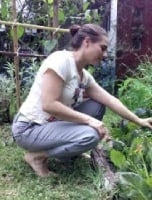Biography
Claudia I. Camacho Benavides is a Mexican biologist, studied an MSc in Ethnobotany at the University of Kent, the U.K. and a PhD in Rural Development at the Universidad Autónoma Metropolitana. She conducts post-doctoral research on the line of Ecological Economics and Rural Development. Her work focuses on biocultural diversity, health and food local systems, health promotion, medical ethnobotany, community-based conservation, and collaborative and participatory research. She has taught training and dissemination courses in these areas. She is part of the Mexican Network of Biocultural Heritage, the Mexican Ethnobiological Association, and the Latin American Network for the Defense of Biocultural Heritage.
ResearchGate:
https://www.researchgate.net/profile/Claudia-Camacho-Benavides
Abstract
Action and resistance in the face of food crisis and transition, the case of Chiltoyac community, México
This work analyses the subsistence and resistance actions of two local groups in the community of Chiltoyac, Xalapa municipal ity, Mexico. The Comunidades Eclesiales de Base (CEB in Spanish) and the Women’s circle of Chiltoyac’s centre for traditions, trades and knowledge, f ace a drastic local food system transformation that comprehends biocultural erosion, transition to a westernised diet and sedentary lifestyles, and new epidemiological conditions. But they also offer alternatives and efforts towards a dignified life, entailing nutritional, health and environmental wellness. Two lifeworlds show up and get in conflict: one that seeks to maintain biocultural diversity and heritage in the local food model, protecting land, biodiversity and local production, pursuing environmental, social and economic benefits in the long run; and another one that prioritises economic benefit in the short term, leaving behind the concern about pollution, food diversity loss and food dependency. Local collective subjects manifest their capability to shape their territory and to modify the course of neoliberal development models, through actions that confront other local subjects, dominant economic tendencies and structures, and unequal power distribution. Local endeavours seem able to reach the revitalisation of a biocultural food system and achieve higher levels of food sovereignty, self-sufficiency and autonomy. Nevertheless, involved groups acknowledge that more local or government support is needed to be successful, and to fully satisfy the rights to food, to a healthy environment and health.
Affiliation: Universidad Autónoma Metropolitana, Mexico

